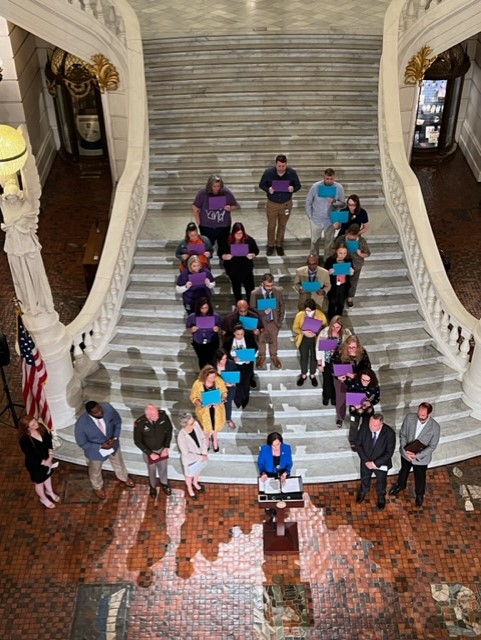
Harrisburg, PA - Today, Department of Human Services (DHS) Secretary Dr. Val Arkoosh, along with leaders from multiple state agencies and suicide prevention advocacy groups, joined together to recognize September as Suicide Prevention Awareness Month. Although mental health and suicide prevention are important to address year-round, this month provides a dedicated time for people, organizations, and communities to join their voices and share that there is hope, help is available, and healing is possible.
“We are here today to remember the lives lost to suicide, acknowledge the millions of people who have struggled with suicidal ideation, and support the individuals, families, and communities that have been impacted,” said Secretary Arkoosh. “Together, we can prevent suicide. By starting the conversation, providing resources, and directing help to those who need it, we can save lives. If you or someone you know is struggling or in crisis, help is available. You are not alone.”
Suicide is a leading cause of death in the United States. In 2021, the most recent year that data is available, suicide was the cause of more than 48,000 deaths in the United States, including over 1,800 Pennsylvanians. According to the CDC in 2021, an estimated 12.3 million adults seriously thought about suicide, 3.5 million made a plan, and 1.7 million survived a suicide attempt. Provisional 2022 data show that deaths by suicide increased by 2.6% between 2021-2022.
The Shapiro Administration is committed to preventing death by suicide by investing in mental health supports for Pennsylvanians. The 2023-2024 bipartisan budget that Governor Shapiro signed includes $20 million to increase base funding for counties to provide critical mental health services and address deepening workforce shortages.
“Most people have been affected by the death of a friend or loved one by suicide - it touches all of us,” said Dr. Debra Bogen, Pennsylvania Acting Secretary of Health. “Don’t be afraid to talk with your loved ones openly about suicide and to offer support and help. Talking about suicide does not increase thoughts of suicide or cause people to act on their thoughts. Acknowledging and talking about suicide lets people know you care.”
“Events like this one today are important for reaching people in crisis and their loved ones with key messages of hope, optimism, and a way forward for a bright future,” said Maj. Gen. Mark Schindler, Pennsylvania’s adjutant general and head of the Department of Military and Veterans Affairs. “Together, we have the power to raise awareness, share valuable information, and ultimately, save lives.”
“One of the myths about suicide is that it is a mental health issue only impacting younger populations. Untreated depression and other psychiatric illnesses are often significant underlying causes for older adults to take their own lives, particularly in men 65 and older,” said Secretary of Aging Jason Kavulich. “Good mental health is crucial to an older adult’s overall wellbeing, and we need to eliminate any stigma that would discourage older adults from seeking assistance. If an older adult is experiencing social isolation, loneliness, or depression, we encourage them to reach out to their local Area Agency on Aging, call 988, or speak with a friend or loved one to get connected to the help they need.”
“Affordable access to mental health and substance use disorder care is essential in the fight to prevent suicides, and under Governor Shapiro’s leadership, the Insurance Department has prioritized ensuring that insurance companies cover mental health and substance use disorder benefits in parity with physical benefits,” said Pennsylvania Insurance Commissioner Michael Humphreys. “No one should ever forgo mental health or substance use disorder treatment due to fear of how much such assistance will cost.”
Last year, the 988 Suicide and Crisis Lifeline officially launched nationwide, streamlining call and text access to the national lifeline that provides no-cost crisis response support 24 hours a day, 365 days a year. Pennsylvania’s 12 lifeline call centers provide support for individuals considering suicide or self-harm, those experiencing a mental health crisis or emotional distress, and for people looking for help for a loved one. Callers to 988 can also connect with the Veterans Crisis Line or assistance in Spanish. Help is available via call, text or chat.
In addition to 988, many other resources are available to Pennsylvanians in need of support, including:
Crisis Text Line: Text “PA” to 741-741
Veteran Crisis Line: 1-800-273-TALK (8255)
Disaster Distress Helpline: 1-800-985-5990
Get Help Now Hotline (for substance use disorders): 1-800-662-4357
Pennsylvania Sexual Assault Helpline: 1-888-772-7227 or https://pcar.org/help-in-pa
National Domestic Violence Helpline: 1-800-799-7233 or www.PCADV.org
AgriStress Helpline: 833-897-2474
To learn more about mental health and crisis supports in Pennsylvania, visit www.dhs.pa.gov/Services/Mental-Health-In-PA.
MEDIA CONTACT: Brandon Cwalina - ra-pwdhspressoffice@pa.gov
# # #